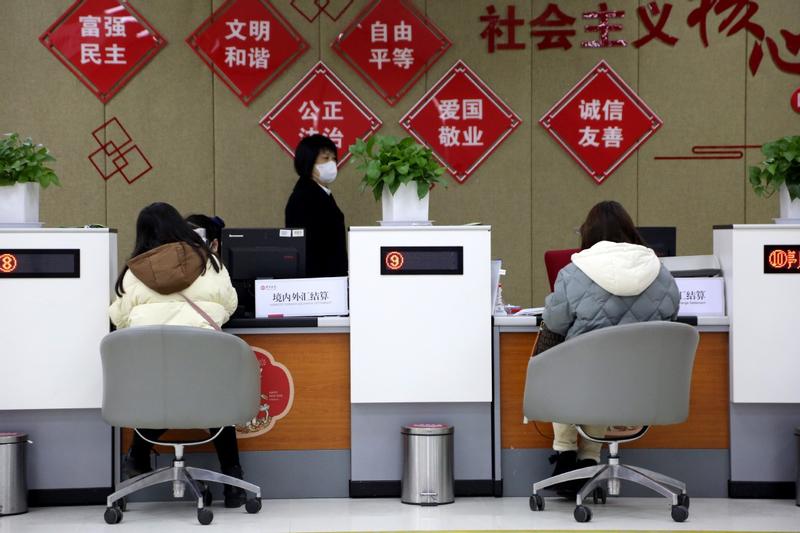 A branch of Bank of China in Lianyungang, Jiangsu province. (WANG CHUN / FOR CHINA DAILY)
A branch of Bank of China in Lianyungang, Jiangsu province. (WANG CHUN / FOR CHINA DAILY)
Taking a leaf out of e-commerce book, an increasing number of commercial banks have started allowing customers to form groups to make term deposits this year, as part of the efforts to gain access to a larger number of customers.
A three-year deposit for a group of two people, for instance, offers an annual interest rate of 3.8 percent, and each person should deposit a minimum of 20,000 yuan
Available on mobile applications or social media platforms of certain banks, the new product allows a customer to invite his or her friends or social media contacts to form a group of two, three or five people, each of whom agrees to deposit a minimum amount of money at a bank offering such products, with the maturity of deposits ranging from three months to three years.
Compared with conventional deposits, this kind of product has more favorable terms, which allow each group member to earn higher interest on a deposit with the same maturity and the same amount of money.
China Construction Bank Corp, the country's second largest State-owned commercial lender by assets, is currently providing a few such products on its mobile banking app. A three-year deposit for a group of two people, for instance, offers an annual interest rate of 3.8 percent, and each person should deposit a minimum of 20,000 yuan (US$2,823).
For a CCB customer who has not formed or joined any group, however, the bank's three-year deposit rate is 2.75 percent.
Smaller banks offer even higher rates for these innovative deposit products.
Bank of Shanghai Co Ltd, a city commercial lender based in Shanghai, is providing a three-year deposit to a group of five people at an annual interest rate of 4.125 percent, with each member depositing at least 50,000 yuan.
The interest rate is much higher than that of the bank's three-year deposit of 50,000 yuan for a single customer, which is 3.6 percent.
The new product is available on the bank's WeChat platform, along with several other products targeting a group of three or five people, with different maturity and different minimum deposit amount.
"This is an innovation of marketing strategies for commercial banks, which have learned from the idea of online group buying. It demonstrates that competition among banks for customers and deposits has become increasingly intensified," said Dong Ximiao, chief analyst at the Zhongguancun Internet Finance Institute.
Whether a deposit product meets regulatory requirements depends on the result of analysis on each product, Dong said.
ALSO READ: Chinese shares higher at midday
Bank of Shanghai's three-year deposit rate of 4.125 percent for a group of five people is within the scope of regulations, for it does not exceed the general deposit rate cap under China's macro-prudential regulation framework, which is 50 percent higher than the three-year benchmark deposit rate of 2.75 percent.
However, some banks created a controversy by allowing each member of a group to deposit a minimum of 50,000 yuan to earn a yield as high as that offered by a large-denomination certificate of deposit, for which the threshold for individual subscription is 200,000 yuan, he said.
Zeng Gang, deputy director-general of the National Institution for Finance and Development, said banks are paying more attention to online marketing because of the novel coronavirus outbreak. As long as a bank has launched this kind of product, others may follow its example.
It is also worth noting whether such deposit products will trigger an increase in the banking sector's liability costs, Zeng said.
Earlier this year, China's central bank further strengthened regulation of deposit interest rates, stating clearly that it will include the minimum rates of return on structured deposits at commercial banks in its macro-prudential assessment system.
READ MORE: PBOC warns of debt pileup amid stimulus
The central bank is expected to reduce the liability costs for banks, drive loan pricing lower and underpin the real economy by taking forceful measures, said analysts led by Ma Kunpeng with SWS Research Co Ltd in a report.


